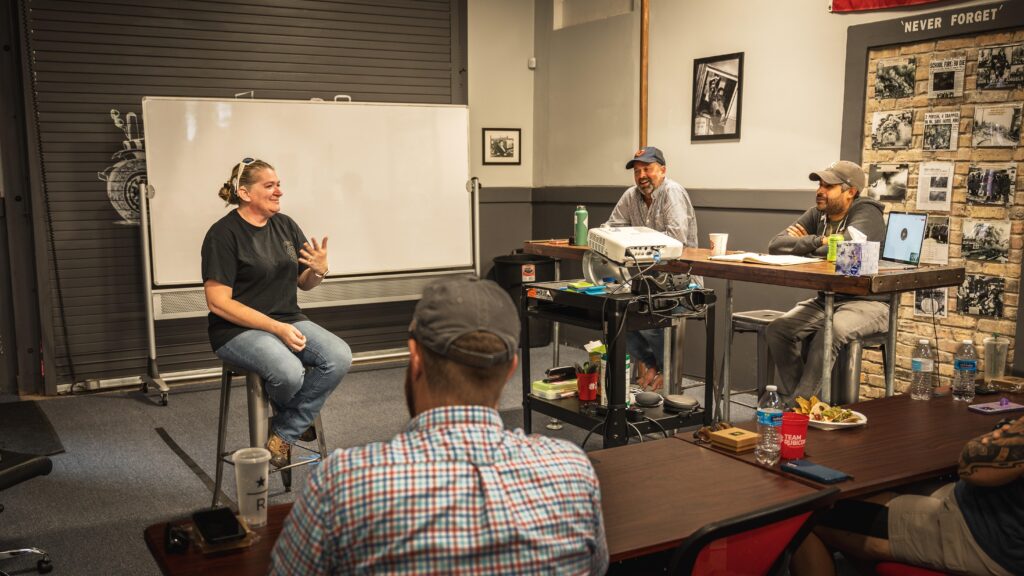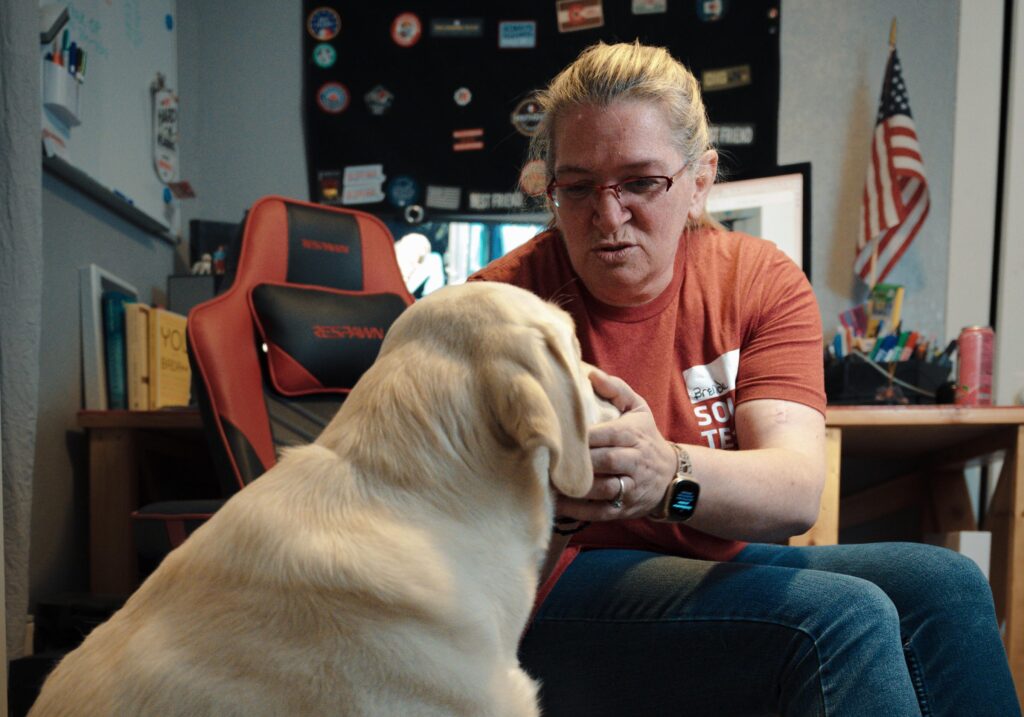Seated in front of dueling computer screens that flicker with maps and data, Brenda Nurre is tapping away madly and firing off dispatch orders. At her feet, a 5-year-old blond named Windy snores softly and chases rabbits in her sleep. The two have been a team since 2019.
With its pale grey walls, tapestry of Team Rubicon operation patches, and American flag hanging just feet above a neatly packed go bag, this room looks remarkably like a mini command center. In fact, this is actually Nurre’s home. It’s also probably the place where she gets the most done for Team Rubicon.
A U.S. Army veteran who separated from service in 1995 and former victim’s advocate for the Pueblo County Sheriff’s Office and member of its Emergency Services Bureau’s Fire, Dive Rescue/Recovery, Search and Rescue teams, Nurre is one very active Greyshirt. Since joining Team Rubicon in 2018, she has deployed on nearly a dozen ops—everything from mitigation operations in her home state of Texas to severe storm responses in Tennessee. She is also a sawyer, a volunteer leader, and an essential member of Team Rubicon’s mighty mobilization—or mob—team.
Despite her passion for in-person service, when the pandemic hit in 2020, Nurre stayed home. A rare autoimmune disease had cost her her hearing a few years prior, which made it increasingly difficult to go out in public. Then, with COVID, masks made it impossible for her to understand anyone. So, Nurre hunkered down and started volunteering in remote positions instead.

“Being able to work remotely made it so that I could still serve and help even if not getting dirty,” says Nurre. “I was still earning my grey shirt and helping other Greyshirts get to the communities we serve.”
Now, from communications to mobilization to planning, Nurre has worn a lot of different remote hats with her grey shirt. And it turned out that being a virtual volunteer was a lot more fun and fulfilling than Nurre expected.
“Remote is great,” says Nurre. “It’s highly beneficial for anybody that still wants to serve but can’t get out into the field. And there’s a remote position for almost every role in Team Rubicon.”
Indeed, some of the most important roles in Team Rubicon—roles essential to successfully launching, conducting, and completing an operation—are filled by virtual volunteers.
Virtual Volunteers Play Essential Roles in Operations
The process of spinning up the typical Team Rubicon operation begins far before the first Greyshirt gets to the FOB, and Nurre has been one of those instrumental in getting operations off the ground, all while being very far away from the operation itself. As a mobilization volunteer, she has helped set up the Recon and Advon teams necessary to get an operation launched, including for a flooding operation in Deaf Smith, TX, and a tornado response in Idabel, OK.
It’s only when those Recon and Advon teams return with reports on the devastation and unmet needs in a disaster-struck area and details on where operation command centers and forward operating bases could be stood up that the mission planning team decides to approve an op. Without people like Nurre working behind the scenes to get the very first Greyshirts into a disaster zone, there would be no operation to launch at all.
Then, once an operation launches, it’s Nurre who’s often there working in mobilization, ensuring the right Greyshirts from around the country get stood up, and that the Greyshirts who sign up get deployed to—and arrive at—the operation.
“We can see they’re gonna need sawyers for this op, or heavy equipment operators, or swampers, or whatever else. We can start instantly looking for those so that when the call to action goes out, we already have a scope of valuable Greyshirts. And we’ll have names that are ready to go.”
The Volunteering Is Virtual; the Friendships Are Real
“A surprising thing about remote volunteering,” Nurre explains, “is that you actually make friends.”
Making friends on a Team Rubicon operation is not unusual. Indeed, for many Greyshirts, it is high on the list of reasons they keep deploying. Yet making friends hundreds or thousands of miles away from the people you’re serving with would seem unlikely. Unless, of course, you’re Brenda Nurre.
Greyshirts in the field may know Nurre best by her “pocket hugs:” little tokens that she gives out to everyone because she wants them to know that she’s always thinking about them. Yet while she may not be seeing those Greyshirts in person when she’s virtually volunteering for an op, something about Nurre transcends it all. This Greyshirt has a knack for making friends.

In part, Nurre credits that to her work as a mobilization volunteer, which allows her to spend a lot of time with her fellow Greyshirts on the operation, even without being on the FOB. She helps other volunteers at every stage of their mobilization, assisting them with their deployments and even troubleshooting for them when flights are canceled or schedules change.
“I communicate a lot with the Greyshirts,” says Nurre about her work on the mob team. “I move them from home to the op and back again and try to do it as nicely as possible.”
She especially likes working with the novice volunteers, first-time Greyshirts who typically don’t even know what to pack. “I get to be their personal cheerleader,” Nurre, of the pocket hugs, says.
The Shirt May Look Clean, but You’re Still GSD
Not everything about virtually volunteering for disaster relief is rainbows and sunshine, she confesses.
“I’m not gonna lie,” admits Nurre, “Remote does sometimes feel like you’re doing absolutely nothing. You know you’re working your ass off, but it feels like you’re doing nothing because you’re not getting shit done in the way you’re used to.”
By that, Nurre means getting sweaty, getting dirty, and getting the satisfaction of seeing what you’ve accomplished for homeowners at the end of the day.
Not only does remote work count as real work, she says, but the truth is that Greyshirts who are virtual volunteers are just as valuable online as they are in the field.
“Without remote help, people in the field … well they wouldn’t be in the field,” quips Nurre. “It just takes everybody working together and remembering that we’re a team for a reason.”
Nurre isn’t exclusively a virtual volunteer. As the pandemic began to wane, she and Windy started to go on deployments and to local events. They went to Team Rubicon’s leadership conference together in 2022, where Nurre was awarded the Spirit of Service award. And, in the spring of 2023, she became a Clay Hunt Fellow. But going out didn’t mean she started doing less. Rather, it seems she keeps doing more. Today, Nurre both deploys in person on operations and serves remotely.
“There really is a place and role for everyone in TR,” says Nurre.
Want to become a virtual volunteer?



